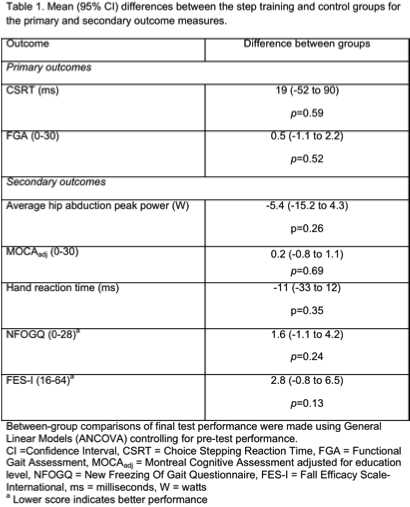Session Information
Date: Thursday, June 8, 2017
Session Title: Parkinson’s Disease: Clinical Trials, Pharmacology And Treatment
Session Time: 1:15pm-2:45pm
Location: Exhibit Hall C
Objective: To determine the effectiveness of 12 weeks of home-based exergame step training for improving stepping performance, physical and neuropsychological measures associated with falls in Parkinson’s disease (PD).
Background: Fall risk in people with PD is associated with impaired balance and poor stepping performance. Home-based exergame step training has the potential to reduce fall risk in PD but has not yet been evaluated.
Methods: Sixty people with PD were randomly allocated into either the step training group (n = 31) or control group (n = 29). The exercise group performed a modified dance-based exergame in their home for at least 15 minutes, 3 times / week for 12 weeks. The control group received no intervention. Both groups continued their usual care and physical activities. The primary outcomes were choice stepping reaction time (CSRT) and the Functional Gait Assessment. Secondary outcomes included physical and neuropsychological measures associated with falls in PD, number of falls and participants’ perceptions of changes in mobility and balance. Adherence to the intervention was collected using log looks.
Results: 28 exercise (90%) and 25 control (86%) participants completed the reassessment. Step training participants completed 86% of the prescribed 36 exercise sessions. There were no between group differences in the primary or secondary outcomes (Table 1), including fall rate [IRR = 1.03 (95% CI 0.46 to 2.32), p=0.94]. Intervention participants reported improvements in mobility whereas control participants reported a deterioration; between-group difference on an 11 point scale = 0.9 (95% CI -1.8 to -0.1, p = 0.03).
Conclusions: This study showed that 12 weeks of step training was not effective in improving stepping performance, physical and neuropsychological measures, or reducing the number of falls in people with PD. However, the self-reported improved mobility in the intervention group highlights the importance of evaluating individuals’ perceptions of the effectiveness of intervention. The high level of adherence to the exergame suggests that this may be a feasible form of exercise for people with PD.
To cite this abstract in AMA style:
J. SONG, S. Paul, M.J. Caetano, S. Smith, L. Dibble, R. Love, D. Schoene, J. Menant, C. Sherrington, S. Lord, C. Canning, N. Allen. Home-based step training using videogame technology in people with Parkinson’s disease: a randomized controlled trial [abstract]. Mov Disord. 2017; 32 (suppl 2). https://www.mdsabstracts.org/abstract/home-based-step-training-using-videogame-technology-in-people-with-parkinsons-disease-a-randomized-controlled-trial/. Accessed December 20, 2025.« Back to 2017 International Congress
MDS Abstracts - https://www.mdsabstracts.org/abstract/home-based-step-training-using-videogame-technology-in-people-with-parkinsons-disease-a-randomized-controlled-trial/

